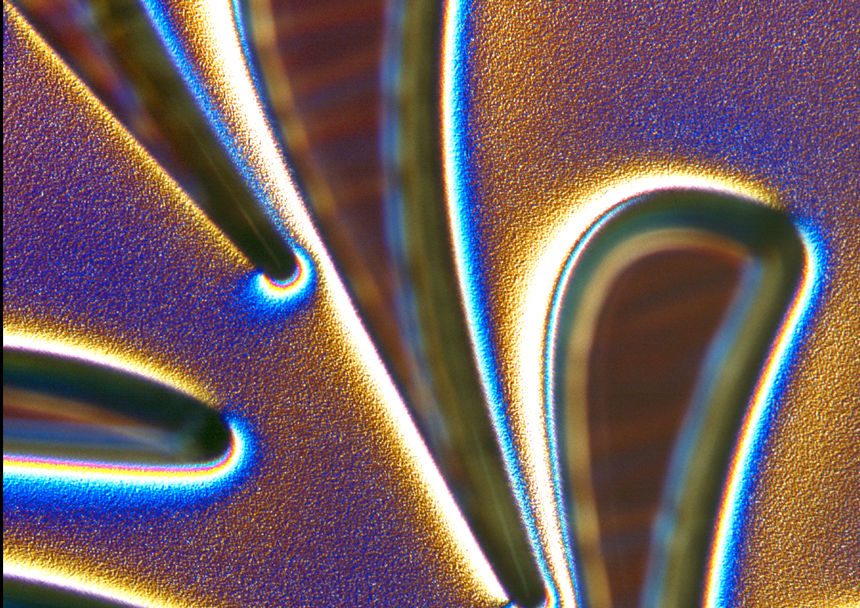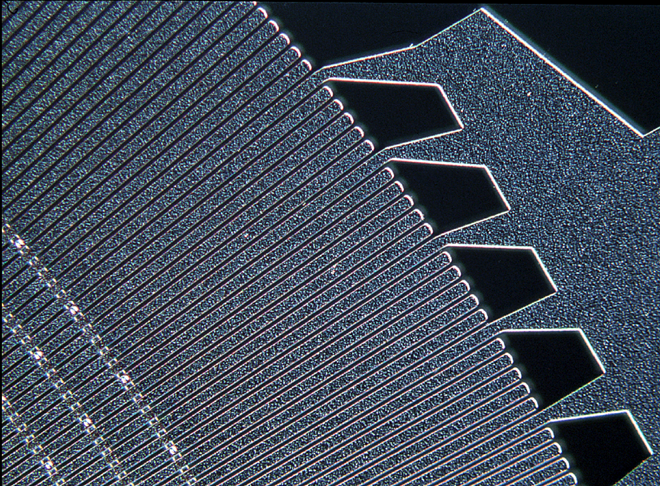Research Projects
Chip-Scale Micro-vacuum Pumps
Eric Newton, Hanqing Li, Martin Schmidt
In this project, we are designing and fabricating new micro-vacuum pumps that could be used for portable diagnostic instruments that require vacuum processing of samples. The devices we are fabricating use a mechanical displacement pump concept that is created with deep reactive ion etching (DRIE) and multi-wafer bonding. The pump is comprised of an inlet and outlet valve and a pump chamber. The valves and pumps are realized using a novel “zipper” electrostatic actuation method that achieves large mechanical stroke (20-40 microns) using relatively low voltages (50-100V). Initial single-stage pumps have been created that achieve vacuum levels of less than 130 Torr. We are currently fabricating a two-stage pump that we anticipate will achieve a sub-30 torr vacuum level, which matches well the requirement for higher vacuum level stages based on field emission.

Microfluidics for Solar Thermal Fuels
Eric Lam, Hanqing Li, Martin Schmidt in collaboration with the research groups of Prof. Klavs Jensen and Prof. Jeff Grossman
Solar thermal fuels are a class of materials that undergo a structural transformation from a low energy state to a higher energy state upon illumination with light, thus “storing” energy in the system. The back reaction of discharging can be triggered through the use of a catalyst, releasing the stored energy as heat. In this project, we have two areas of focus: the development of new microfluidic instrumented reactors that can be used for detailed characterization of the properties of solar thermal fuels, and the design of micro-systems that use solar thermal fuels for portable energy conversion devices.

Low Capital Cost Micro/Nano Fabrication Tools
Parker Gould, Mitchell Hsing, Hanqing Li, Martin Schmidt in collaboration with the research group of Prof. Karen Gleason
Historically, the manufacture of micro/nano scale devices has been accomplished using the semiconductor manufacturing paradigm, namely the tools and processes that have been developed for the integrated circuit industry. This manufacturing platform has been extremely successful in achieving unprecedented levels of complexity, yield, and cost effectiveness in high volume. Driven by Moore’s Law, the industry has delivered this performance by increasing the scale of manufacturing. Coupled with this has been a rapid increase in the capital costs for the tools. While this model has worked well for the integrated circuit industry, which is able to leverage a common standard manufacturing process (e.g., CMOS), for emerging areas with non-standard processes (MEMS, bioMEMS, photonics) the economics of this manufacturing paradigm can make this approach economically unfeasible. For this reason, we have embarked on an ambitious project to radically lower (by at least 100x) the capital cost of tools to micro/nano fabricate devices. Our early work focused on the use of ink-jet printing methods. More recently, we have begun projects to realize a family of “table-top” tools that match the performance of the large tools but achieve radically lower capital costs by a corresponding reduction in production throughput. This family of tools would enable a scalable production system where the capital costs of the factory can be matched to the market size.